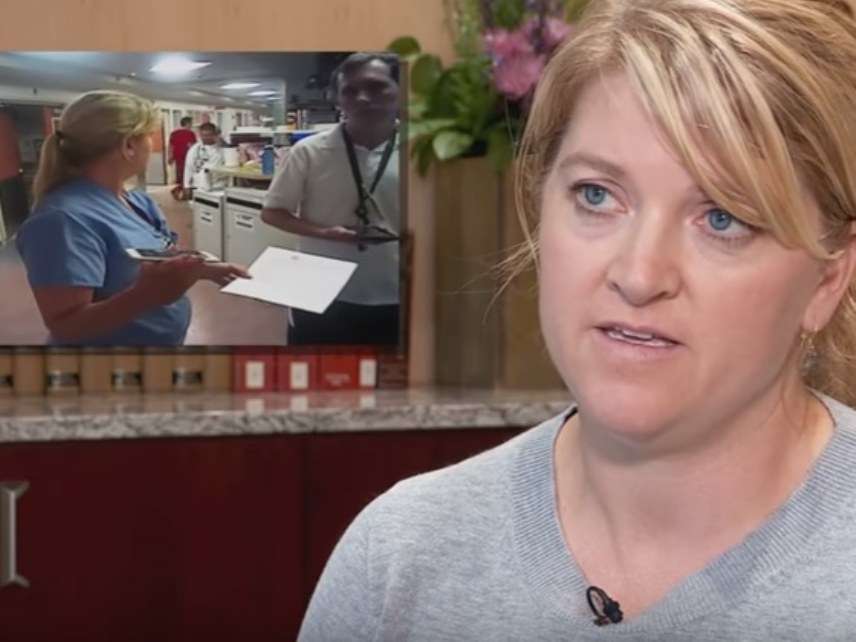Utah Nurse's Abuse by Police Detective Goes Viral; Does the Outrage Actually Mean Anything?
Even other law enforcement agencies are throwing shade.

A Utah hospital that became the center of a holiday weekend media blitz has enacted new controls on police access in order to avoid a repeat of a nurse's abuse and arrest.
A Salt Lake City police detective's terrible treatment of University of Utah nurse Alex Wubbels was the outrage story of the weekend. In the July incident, Wubbels refused to comply with Det. Jeff Payne's demands for the blood of a man put in a coma when he was struck during a high-speed chase. (The patient in question was an innocent bystander, and he was not suspected of any misconduct.) This past Thursday, Wubbels released body camera footage that showed Payne responding to her refusal by roughly manhandling and briefly arresting her.
Everything about the video footage cast Payne in a terrible light. Wubbels didn't just randomly decide on her own to defy his orders: She had hospital administrators on the phone with her to explain that she was following hospital policy. Payne didn't have a warrant, the patient was not under arrest, and the patient was not able to consent to the blood draw. Wubbels said she was not permitted to assist. Payne responded by dragging her out of the hospital.
On Monday, hospital officials revealed that they were so appalled by Payne's behavior that they've changed their rules to control how and where police officers may seek access. (This policy shift had apparently already happened before the publicity caused by the videos.) Police are no longer permitted in patient care areas, and they'll have to go higher up the supervisory ladder when they have requests rather than dealing directly with the nurses.
To see how little support Payne is receiving even from other authority figures, consider the reaction from one of the employers of the comatose patient, William Gray of Idaho. Gray is a trucker, but he's also a reserve police officer with the Rigby Police in Idaho. As Wubbels' story was going viral, the Rigby Police posted a message on Facebook that, in no uncertain terms, defended the nurse's decision to resist Payne's orders:
Within the first hours of Officer Gray being admitted into the burn unit, an incident occurred between hospital staff and an officer from an agency in Utah who was assisting with the investigation. The Rigby Police Department was not aware of this incident until August 31st, 2017. The Rigby Police Department would like to thank the nurse involved and hospital staff for standing firm, and protecting Officer Gray's rights as a patient and victim. Protecting the rights of others is truly a heroic act.
The Rigby Police Department would also like to acknowledge the hard work of the involved agencies, and trusts that this unfortunate incident will be investigated thoroughly, and appropriate action will be taken.
It is important to remember that Officer Gray is the victim in this horrible event, and that at no time was he under any suspicion of wrongdoing. As he continues to heal, we would ask that his family be given privacy, respect, and prayers for continued recovery and peace.
Possibly not getting enough attention in all this is Wubbels' concern that what happened to her might not be an isolated incident. I don't mean the arrest; I mean nurses being pressured to assist police in drawing blood when the cops don't have warrants and the patients are not consenting. In interviews since she's gone public (such as this one with KUTV2), Wubbels has said that her original goal in releasing the videos was to reach nurses and police in rural areas of Utah to "get the education out there" about appropriate conduct in these cases.
At Reason we have regularly documented brutal police searches. Cops frequently run roughshod over citizens' Fourth Amendment rights in zealous attempts to get evidence of even the pettiest of crimes. It would not come as a surprise if other nurses felt like they had little choice but to cooperate with police demands to draw blood, even after the Supreme Court ruled a year ago that a warrant was required under such circumstances.
It's good that Wubbels' treatment by Payne (and by his watch commander—let us not forget that Payne was "following orders") inspired mass outrage. But it's not just Wubbels, or just nurses, who face this problem. This is part of a much larger pattern of police routinely violating the Fourth Amendment, often aided and abetted by courts.

Show Comments (79)